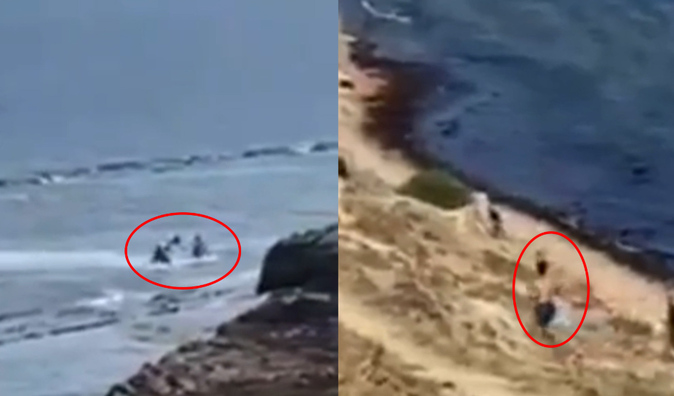Immigration Algeria's latest migratory challenge: jet skis heading to Almería
Algeria fulfills its threat and begins to flood the Spanish coast with small boats
The coasts of the
Campo de Gibraltar,
mainly the beaches of
Algeciras
and
Tarifa,
continue to concentrate clandestine immigration.
Despite the fact that since the Government of Pedro Sánchez approached positions with
Morocco
after sacrificing its position on the Sahara, it has lowered the boats by 34% until the month of August, the reality is that the drama does not stop.
The Civil Guard continues to be overwhelmed by the "massive passes" at sea and warns of the high number of immigrants reaching the Spanish coast aboard jet skis.
In the summer season and taking advantage of the good state of the sea and the visibility conditions, the crossing attempts made by the mafias multiply.
As confirmed by Spanish security sources, every day there are more landings that occur on the beaches near Algeciras.
"This is what happens every day in the afternoon, more than 20 jet skis, tires and Phantoms carrying an average of 70-80 Moroccans without papers to the coast of the Peninsula," they add.
The "crossings" usually take place in the afternoon and some boats used for this make two turns and are even detected by surveillance services but, due to the large number and the extreme speed with which they sail, it is impossible to intercept them.
The price for crossing can reach up to 3,000 euros.
The trafficking networks also take advantage of these trips to introduce drugs, camouflaging them among the boats and jet skis that are dedicated to human trafficking.
On the
Tarajal beach
in
Ceuta,
also every day the Civil Guard has to go out to pick up "swimmers" who try to skirt the breakwater of the Ceuta border.
As this newspaper has been able to learn, in the last three nights more than 100 people trying to swim to Ceuta were intercepted by the Maritime Service boat and some 400 throughout the week.
This situation has resulted in a wide police deployment in the vicinity of the Tarajal breakwater to prevent the attempted entry of an average of 50 people
On the other side, the boats of the Moroccan Royal Gendarmerie are preventing migrants from approaching the beach of Ceuta by swimming, supported by the device deployed by the auxiliary forces on the Moroccan shore, which also manages to dissuade people who want to reach Spain.
jumps over the fence
On a daily basis, the State Security Forces and Bodies try to repel attempts by sub-Saharans to jump over the fence from the nearby forests.
Morocco has the area armored with a large Gendarmerie device aided by auxiliary forces to prevent approaches to the perimeter.
At the moment,
Rabat
is fulfilling the task of obtaining immigration control in exchange for constant sums of money that the
European Union
demands for the outsourcing of its land borders.
It has already announced an injection of 500 million euros to carry out immigration control.
Regarding the new method of reaching Spanish territory, the
Unified Association of Civil Guards
(AUGC) warned this Monday of the presence of jet skis and revealed their modus operandi: transfer the person by motorcycle and throw them into the sea near the coast when they are located by the Maritime Rescue troops.
Luis Bueno Álvarez
, AUGC organization secretary, explains the situation to EL MUNDO.
“Only over the weekend we have located more than 10”, and in the last hours two minors also tried to reach the coast of Tarifa through said system.
To all this, we must add the usual boats.
From Saturday to Monday, more than fifty people have been located in various areas of the Strait.
"They throw the person into the sea and manage to escape since the first thing is human life and they know that we are going to go rescue them," explains the agent.
Bueno Álvarez admits that "the routes are being diverted to the Canary Islands and mainly to Almería" but makes it clear that the situation on the Cadiz coast "is not over".
That is why he requests an increase in the workforce.
The catalog of jobs is more than 30 years old and, he adds, "we are in an area where, in addition to immigration, there are other problems such as drug trafficking, tobacco smuggling and the Gibraltar border."
For all these reasons, AUGC calls for the special singularity of the Campo de Gibraltar.
“The problem is that here we have become accustomed year after year to concentrating scandalous figures and when we say that there are ten or fifteen migrants we no longer give it importance”, as happens, adds the representative of the Benemérita group, with hashish.
Conforms to The Trust Project criteria
Know more
Refugees
immigration

